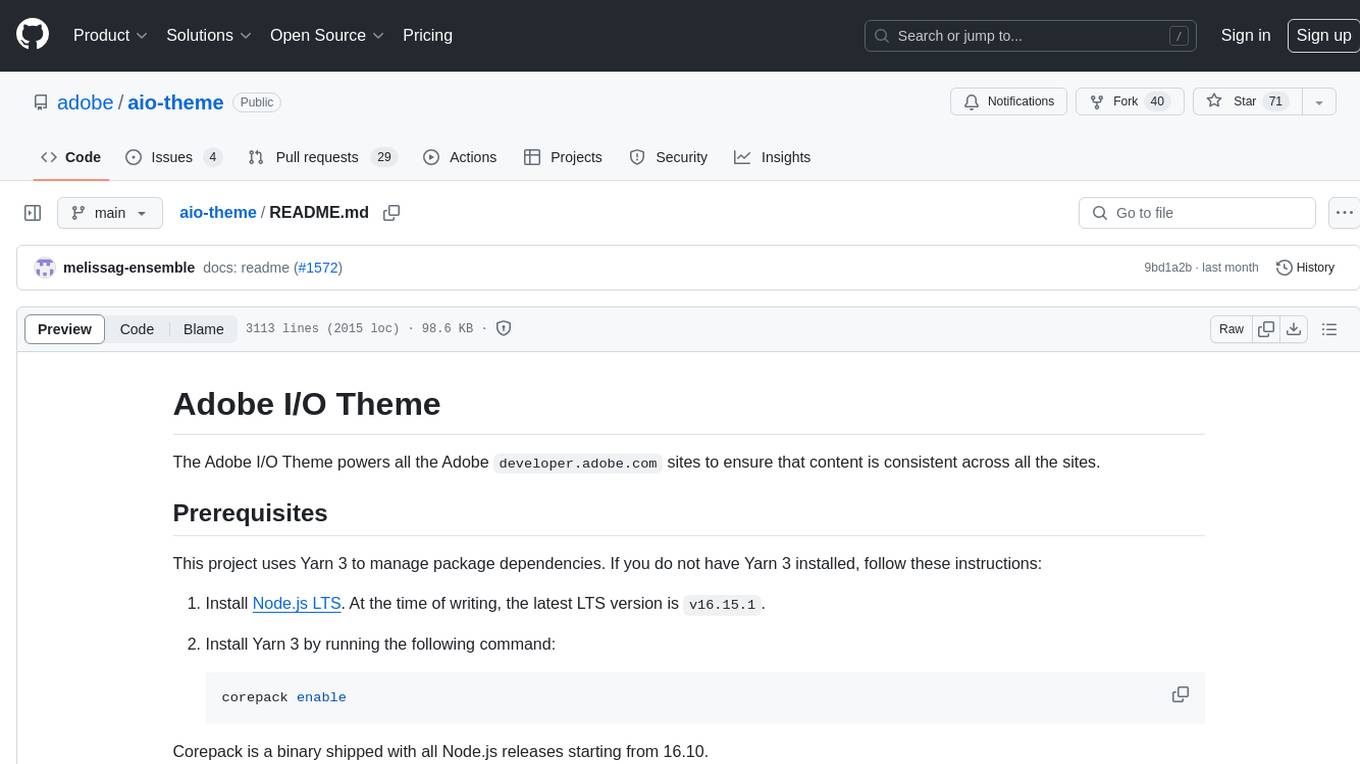
laravel-crod
Make easy & fast crud for Laravel with automatic query like AI
Stars: 116
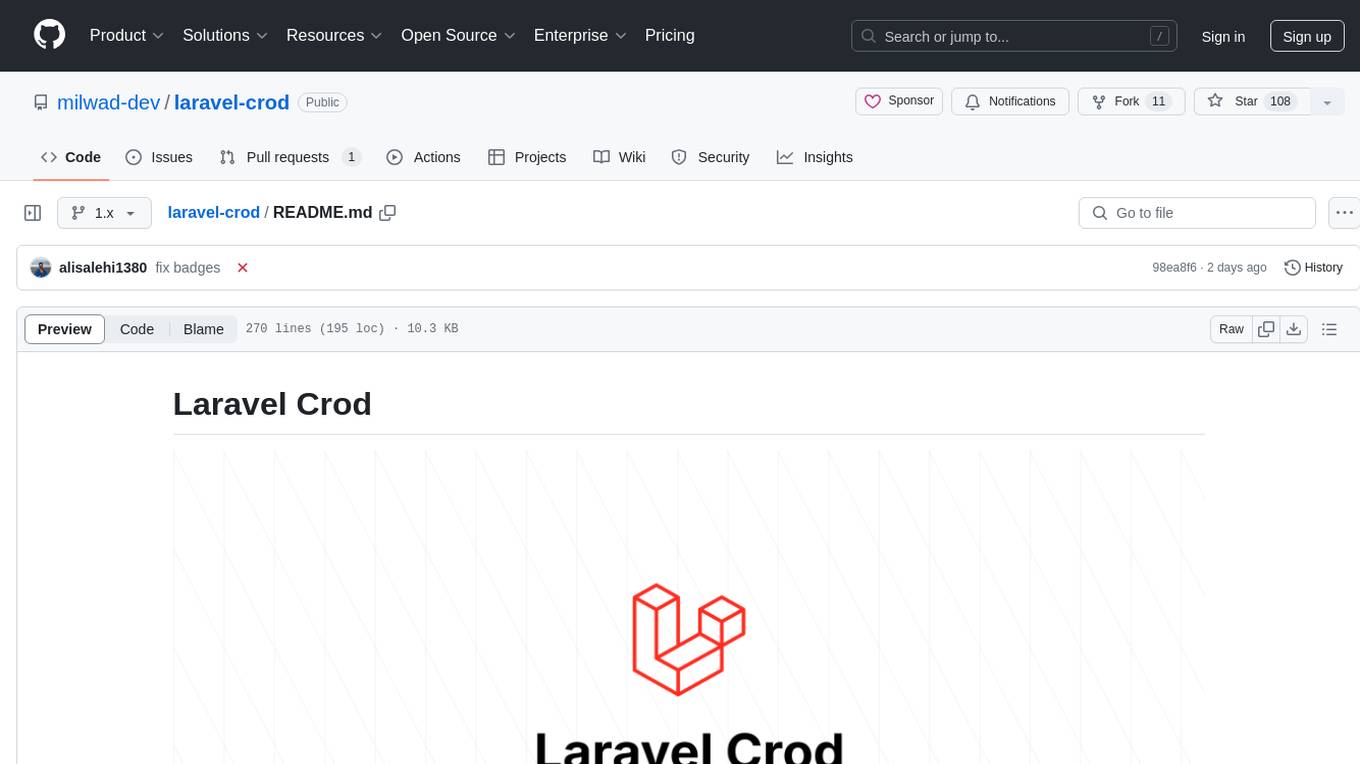
Laravel Crod is a package designed to facilitate the implementation of CRUD operations in Laravel projects. It allows users to quickly generate controllers, models, migrations, services, repositories, views, and requests with various customization options. The package simplifies tasks such as creating resource controllers, making models fillable, querying repositories and services, and generating additional files like seeders and factories. Laravel Crod aims to streamline the process of building CRUD functionalities in Laravel applications by providing a set of commands and tools for developers.
README:
Laravel crod is a package for implementing CRUD faster and easier. You can quickly create controllers, models, migrations, services, repositories, views and requests. You can make it automatically fillable for models, query for repositories and services, make resource controllers, and have a lot of options.
Docs: https://github.com/milwad-dev/laravel-crod/wiki
PHP: ^8.0Laravel framework: ^9doctrine/dbal: ^3.6
| Crod | L7 | L8 | L9 | L10 | L11 |
|---|---|---|---|---|---|
| 1.0 | ✅ | ✅ | ✅ | ❌ | ❌ |
| 1.1 | ❌ | ❌ | ✅ | ✅ | ✅ |
| 1.2 | ❌ | ❌ | ✅ | ✅ | ✅ |
| 1.3 | ❌ | ❌ | ✅ | ✅ | ✅ |
| 1.4 | ❌ | ❌ | ✅ | ✅ | ✅ |
composer require milwad/laravel-crodAfter installation, you need to publish config files.
php artisan vendor:publish --provider="Milwad\LaravelCrod\LaravelCrodServiceProvider" --tag="laravel-crod-config"When you install the Laravel Crod, a series of commands will be activated for you. For see these commands, you can run below command:
php artisanFor creating crud files, you need to run the crud:make command in your terminal:
php artisan crud:make {name}For example
php artisan crud:make ProductWhen you execute this command, after creating the files, you will see a list of options that will create a series of additional files for you, which of course are optional, you can choose and if you need, it will create additional files for you such as seeder, factory, repository, etc.
✅ After, you can see Laravel Crod creates crud files such as Model, Controller, Form-Requests, Migrations etc.
If you run crud:query command, the result is:
- Add
index,create,store,edit,update,destroyfunction to your controller - Get all migration columns and move it to your model fillable
- Add
index,findById,deletefunctions to your repositories - Add
store,updatefunctions to your services - Add resource route (SOON)
** You must run the migrate command, before crud:query command. **
php artisan migrateFor using automatic query, you can run below command:
php artisan crud:query {table_name} {model} {--id-controller}For example:
php artisan crud:query products ProductWhen you add --id-controller option, the Laravel Crod create crud functions without Route Model Binding in controller.
After you can see Laravel Crod added query to service, repository, controller, model, etc.
If you are using Modular Architecture, you are able to run crud:make-module command. This command create a new module and create the default crud files such as Model, Controller, Migration, etc:
php artisan crud:make-module {module_name}For example:
php artisan crud:make-module ProductWhen you execute this command, after creating the files, you will see a list of options that will create a series of additional files for you, which of course are optional, you can choose and if you need, it will create additional files for you such as seeder, factory, repository, etc.
This command adds query and date to CRUD files for module.
This command is similar to crud:query command, but this command is for module. if you have a modular you can write your module name and Laravel Crod find it automatically.
** You must run your migration file **
php artisan crud:query-module {table_name} {model} {--id-controller}
For example:
php artisan crud:query-module products ProductOR
php artisan crud:query-module products Product --id-controllerWhen you add --id-controller option, the Laravel Crod create crud functions without Route Model Binding in controller.
After you can see Laravel Crod added query to service, repository, controller, model, ... for your module.
You can custom file path in config file. ``````
With Laravel Crod config, you can customize the commands, for example you want to set the route file name.
This config file exists in config/laravel-crod.php:
<?php
return [
/*
* Repository namespace.
*
* This is a word that move into the latest name of repository file, for ex: ProductRepo.
* If this value is changed, any repos that are created will be renamed, for ex: ProductRepository.
*/
'repository_namespace' => 'Repo',
/*
* Get main controller.
*
* This is a namespace of main controller that default path is `App\Http\Controllers\Controller`.
*/
'main_controller' => 'App\Http\Controllers\Controller',
/*
* Are using PEST?
*
* If you are using PEST framework, you can change it this value to `true`.
*/
'are_using_pest' => false,
/*
* Route namespace.
*
* This is a word that move into the latest name of route file.
*/
'route_namespace' => '',
/*
* Route name.
*
* This is a word that name of route file.
*/
'route_name' => 'web',
/*
* Modules config.
*
* You can make custom modules with special folders ... .
*/
'modules' => [
'module_namespace' => 'Modules', // This value is for the name of the folder that the modules are in.
'model_path' => 'Entities', // This value is for the name of the folder that contains the module models.
'migration_path' => 'Database\Migrations', // This value is for the name of the folder that contains the module migrations.
'controller_path' => 'Http\Controllers', // This value is for the name of the folder that contains the module controllers.
'request_path' => 'Http\Requests', // This value is for the name of the folder that contains the module requests-form.
'view_path' => 'Resources\Views', // This value is for the name of the folder that contains the module views.
'service_path' => 'Services', // This value is for the name of the folder that contains the module services.
'repository_path' => 'Repositories', // This value is for the name of the folder that contains the module Repositories.
'feature_test_path' => 'Tests\Feature', // This value is for the name of the folder that contains the module feature-tests.
'unit_test_path' => 'Tests\Unit', // This value is for the name of the folder that contains the module unit-tests.
'provider_path' => 'Providers', // This value is for the name of the folder that contains the module providers.
'factory_path' => 'Database\Factories', // This value is for the name of the folder that contains the module factories.
'seeder_path' => 'Database\Seeders', // This value is for the name of the folder that contains the module seeders.
'route_path' => 'Routes', // This value is for the name of the folder that contains the module routes.
],
/*
* Queries.
*
* This is some config for add queries.
*/
'queries' => [
/*
* Except columns in fillable.
*
* This `except_columns_in_fillable` must be arrayed!
* This `except_columns_in_fillable` that remove field from $fillable in model.
*/
'except_columns_in_fillable' => [
'id', 'updated_at', 'created_at',
],
],
];- This package is created and modified by Milwad Khosravi for Laravel >= 9 and is released under the MIT License.
Run the tests with:
vendor/bin/phpunit
composer test
composer test-coverageThis project exists thanks to all the people who contribute. CONTRIBUTING
If you've found a bug regarding security please mail [email protected] instead of using the issue tracker.
The Laravel-Crod is a simple yet powerful package that can help you create CRUD operations for your Laravel models in just a few lines of code. By following this documentation, you should now have a better understanding of how to use the package in your Laravel project. If you have any issues or questions, please feel free to open an issue on the package's GitHub repository.
If this package is helpful for you, you can buy a coffee for me :) ❤️
- Iraninan Gateway: https://daramet.com/milwad_khosravi
- Paypal Gateway: SOON
- MetaMask Address:
0xf208a562c5a93DEf8450b656c3dbc1d0a53BDE58
For Tasks:
Click tags to check more tools for each tasksFor Jobs:
Alternative AI tools for laravel-crod
Similar Open Source Tools

laravel-crod
Laravel Crod is a package designed to facilitate the implementation of CRUD operations in Laravel projects. It allows users to quickly generate controllers, models, migrations, services, repositories, views, and requests with various customization options. The package simplifies tasks such as creating resource controllers, making models fillable, querying repositories and services, and generating additional files like seeders and factories. Laravel Crod aims to streamline the process of building CRUD functionalities in Laravel applications by providing a set of commands and tools for developers.
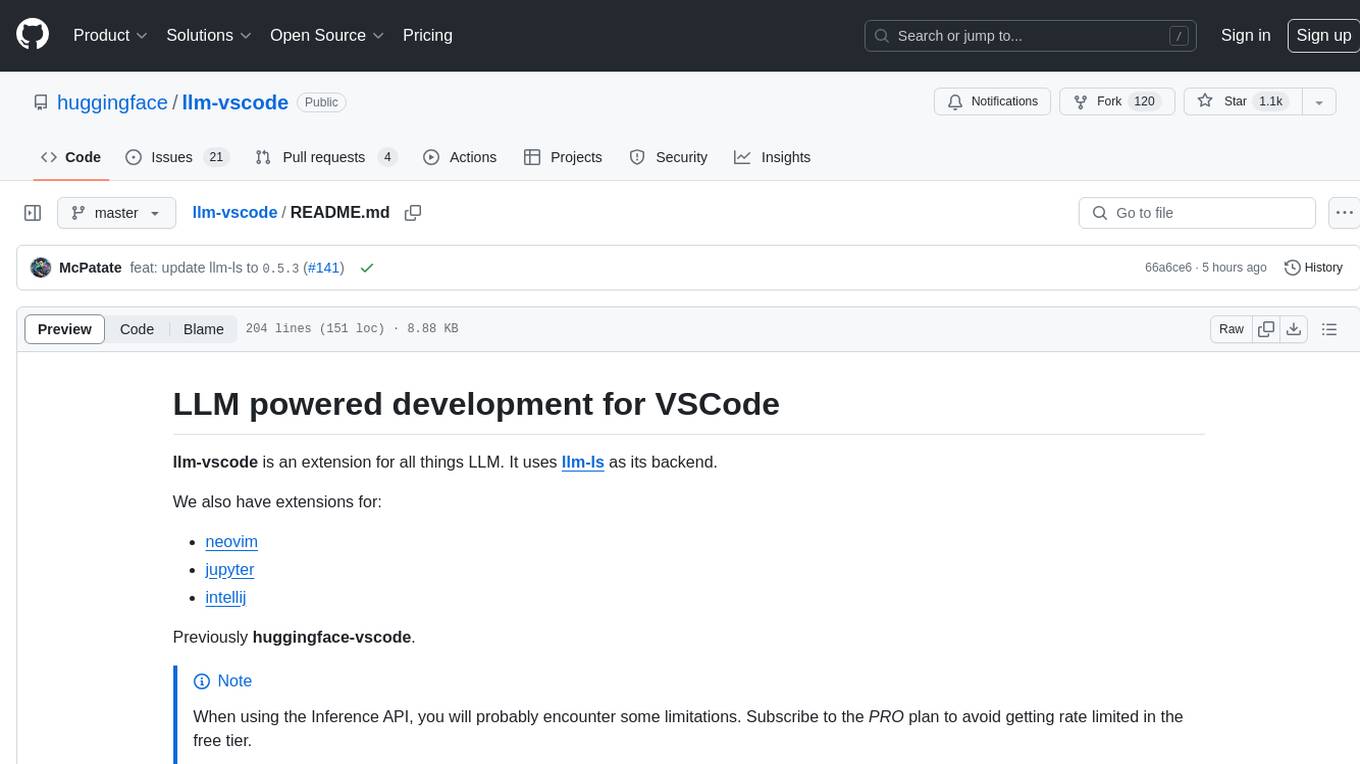
llm-vscode
llm-vscode is an extension designed for all things LLM, utilizing llm-ls as its backend. It offers features such as code completion with 'ghost-text' suggestions, the ability to choose models for code generation via HTTP requests, ensuring prompt size fits within the context window, and code attribution checks. Users can configure the backend, suggestion behavior, keybindings, llm-ls settings, and tokenization options. Additionally, the extension supports testing models like Code Llama 13B, Phind/Phind-CodeLlama-34B-v2, and WizardLM/WizardCoder-Python-34B-V1.0. Development involves cloning llm-ls, building it, and setting up the llm-vscode extension for use.
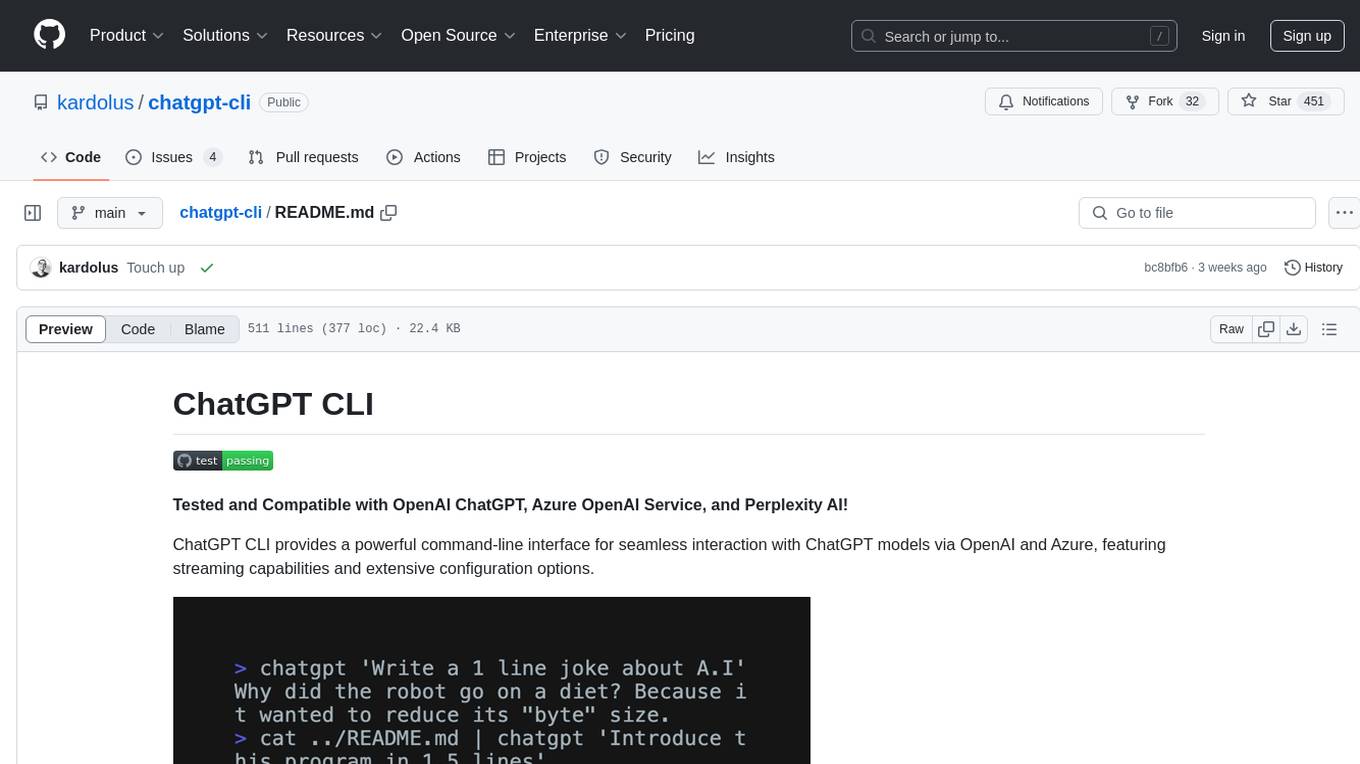
chatgpt-cli
ChatGPT CLI provides a powerful command-line interface for seamless interaction with ChatGPT models via OpenAI and Azure. It features streaming capabilities, extensive configuration options, and supports various modes like streaming, query, and interactive mode. Users can manage thread-based context, sliding window history, and provide custom context from any source. The CLI also offers model and thread listing, advanced configuration options, and supports GPT-4, GPT-3.5-turbo, and Perplexity's models. Installation is available via Homebrew or direct download, and users can configure settings through default values, a config.yaml file, or environment variables.
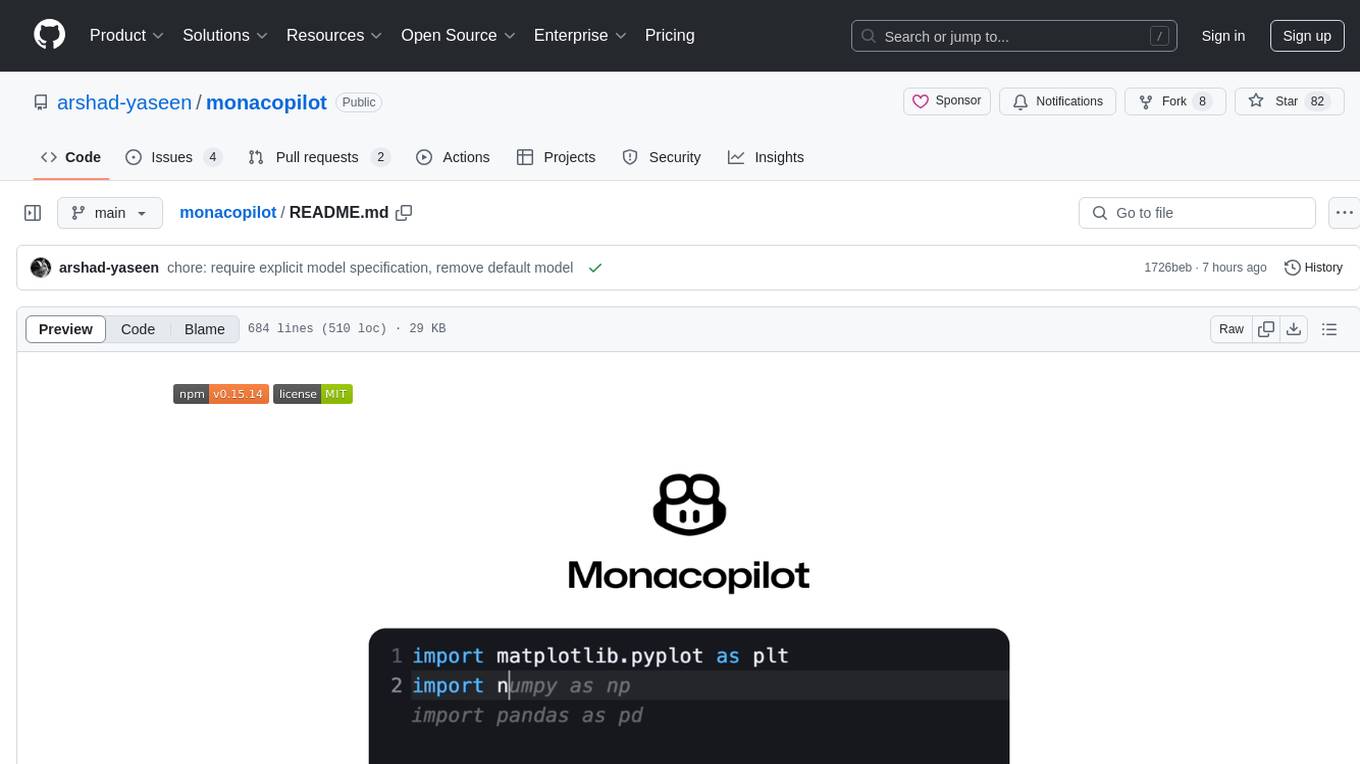
monacopilot
Monacopilot is a powerful and customizable AI auto-completion plugin for the Monaco Editor. It supports multiple AI providers such as Anthropic, OpenAI, Groq, and Google, providing real-time code completions with an efficient caching system. The plugin offers context-aware suggestions, customizable completion behavior, and framework agnostic features. Users can also customize the model support and trigger completions manually. Monacopilot is designed to enhance coding productivity by providing accurate and contextually appropriate completions in daily spoken language.

langserve
LangServe helps developers deploy `LangChain` runnables and chains as a REST API. This library is integrated with FastAPI and uses pydantic for data validation. In addition, it provides a client that can be used to call into runnables deployed on a server. A JavaScript client is available in LangChain.js.
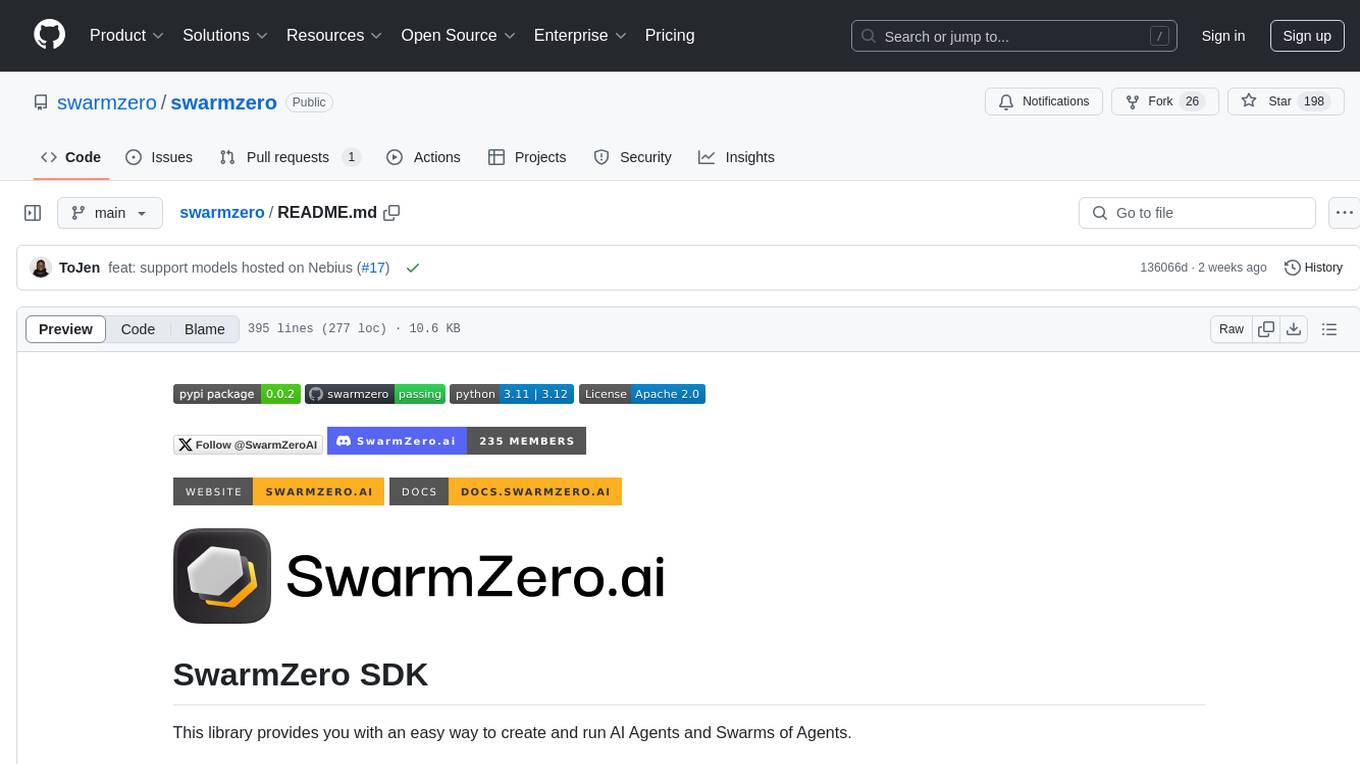
swarmzero
SwarmZero SDK is a library that simplifies the creation and execution of AI Agents and Swarms of Agents. It supports various LLM Providers such as OpenAI, Azure OpenAI, Anthropic, MistralAI, Gemini, Nebius, and Ollama. Users can easily install the library using pip or poetry, set up the environment and configuration, create and run Agents, collaborate with Swarms, add tools for complex tasks, and utilize retriever tools for semantic information retrieval. Sample prompts are provided to help users explore the capabilities of the agents and swarms. The SDK also includes detailed examples and documentation for reference.
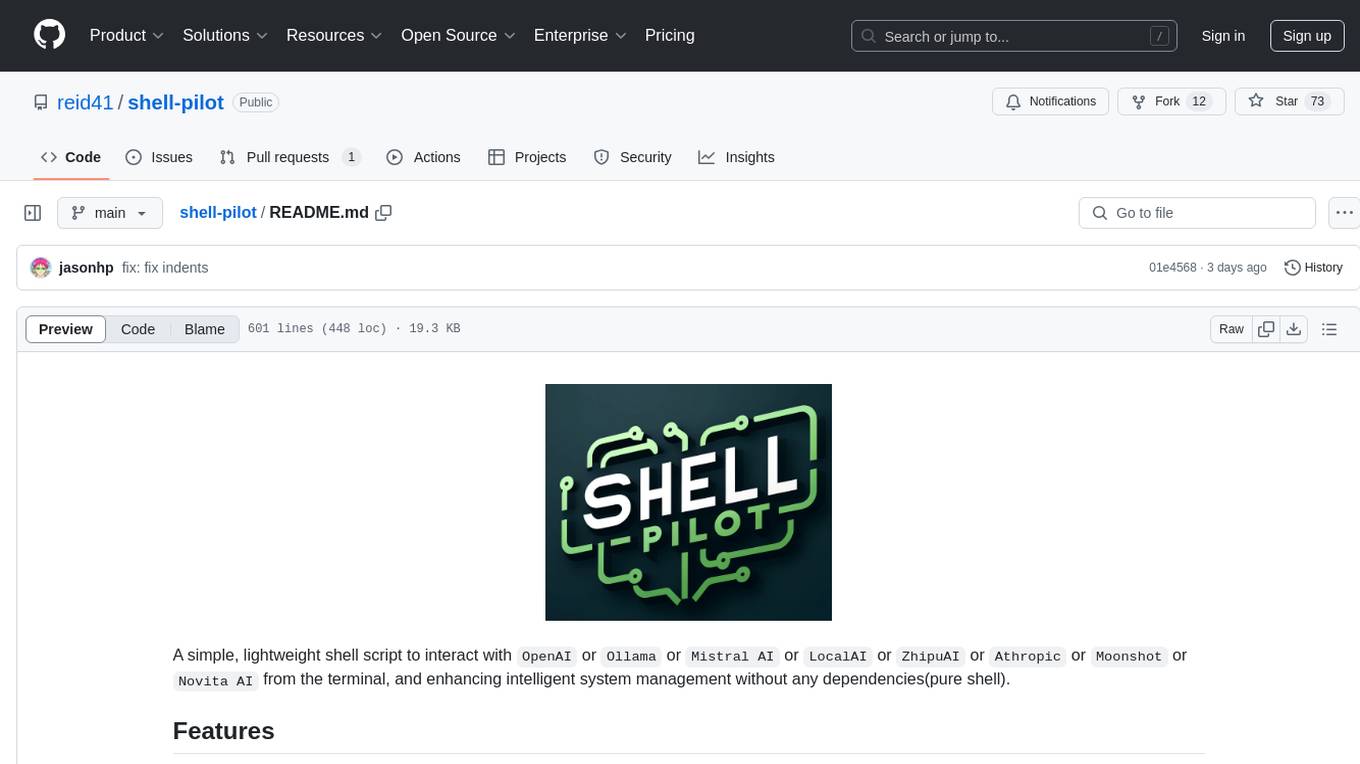
shell-pilot
Shell-pilot is a simple, lightweight shell script designed to interact with various AI models such as OpenAI, Ollama, Mistral AI, LocalAI, ZhipuAI, Anthropic, Moonshot, and Novita AI from the terminal. It enhances intelligent system management without any dependencies, offering features like setting up a local LLM repository, using official models and APIs, viewing history and session persistence, passing input prompts with pipe/redirector, listing available models, setting request parameters, generating and running commands in the terminal, easy configuration setup, system package version checking, and managing system aliases.
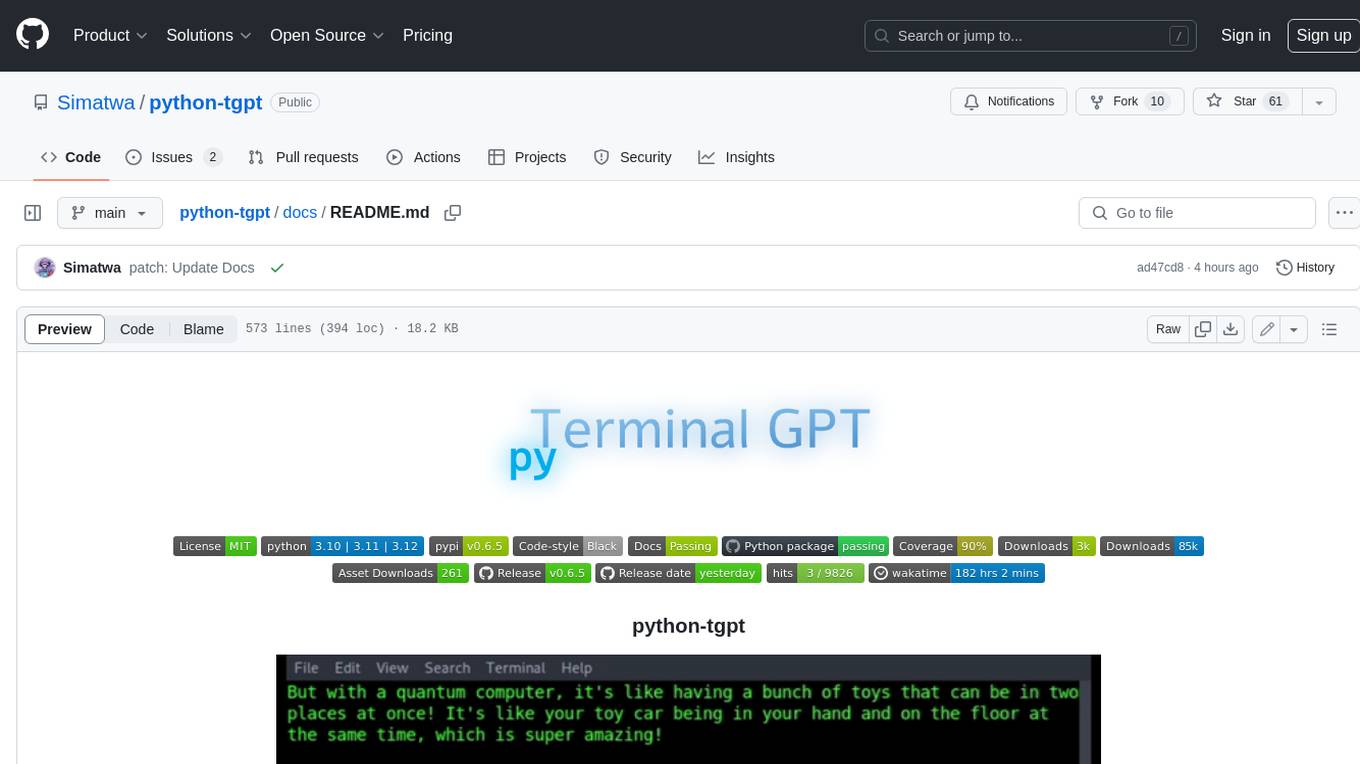
python-tgpt
Python-tgpt is a Python package that enables seamless interaction with over 45 free LLM providers without requiring an API key. It also provides image generation capabilities. The name _python-tgpt_ draws inspiration from its parent project tgpt, which operates on Golang. Through this Python adaptation, users can effortlessly engage with a number of free LLMs available, fostering a smoother AI interaction experience.
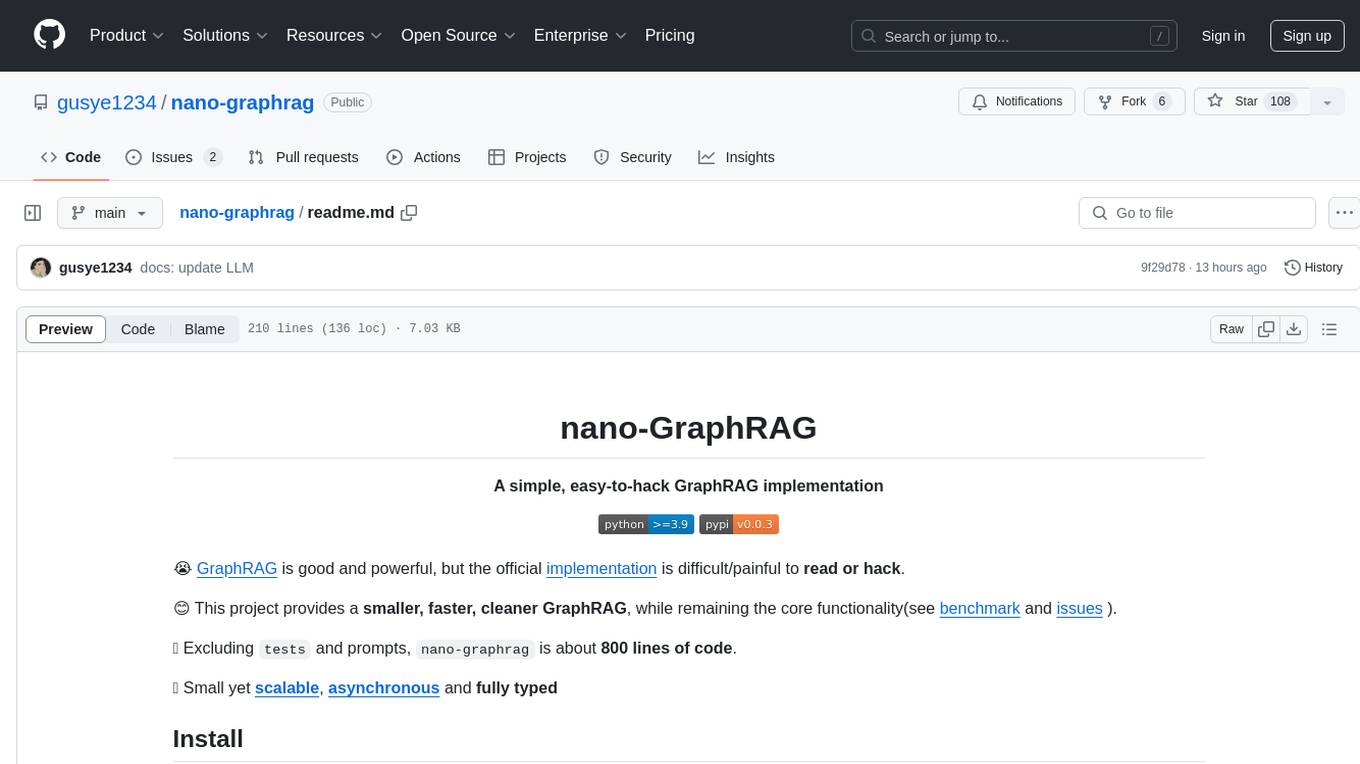
nano-graphrag
nano-GraphRAG is a simple, easy-to-hack implementation of GraphRAG that provides a smaller, faster, and cleaner version of the official implementation. It is about 800 lines of code, small yet scalable, asynchronous, and fully typed. The tool supports incremental insert, async methods, and various parameters for customization. Users can replace storage components and LLM functions as needed. It also allows for embedding function replacement and comes with pre-defined prompts for entity extraction and community reports. However, some features like covariates and global search implementation differ from the original GraphRAG. Future versions aim to address issues related to data source ID, community description truncation, and add new components.

chat-ui
A chat interface using open source models, eg OpenAssistant or Llama. It is a SvelteKit app and it powers the HuggingChat app on hf.co/chat.
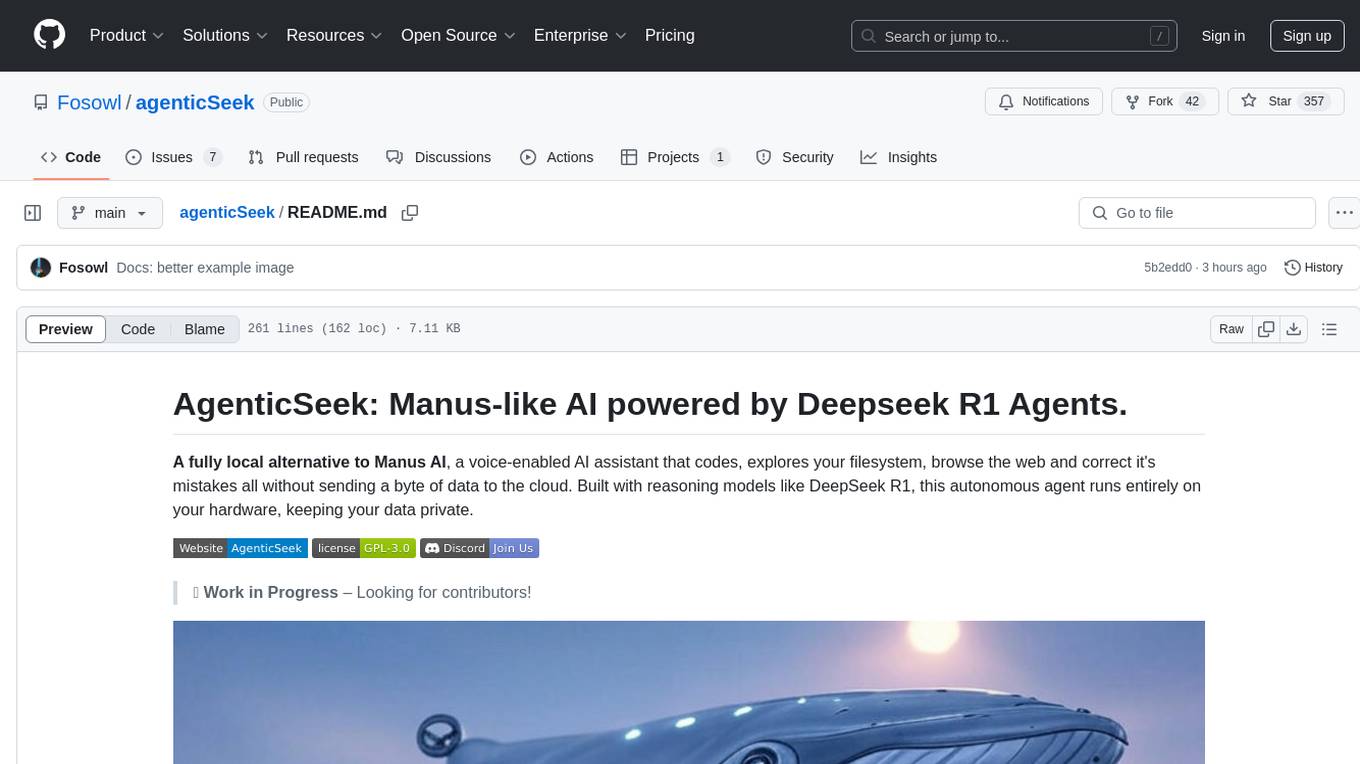
agenticSeek
AgenticSeek is a voice-enabled AI assistant powered by DeepSeek R1 agents, offering a fully local alternative to cloud-based AI services. It allows users to interact with their filesystem, code in multiple languages, and perform various tasks autonomously. The tool is equipped with memory to remember user preferences and past conversations, and it can divide tasks among multiple agents for efficient execution. AgenticSeek prioritizes privacy by running entirely on the user's hardware without sending data to the cloud.
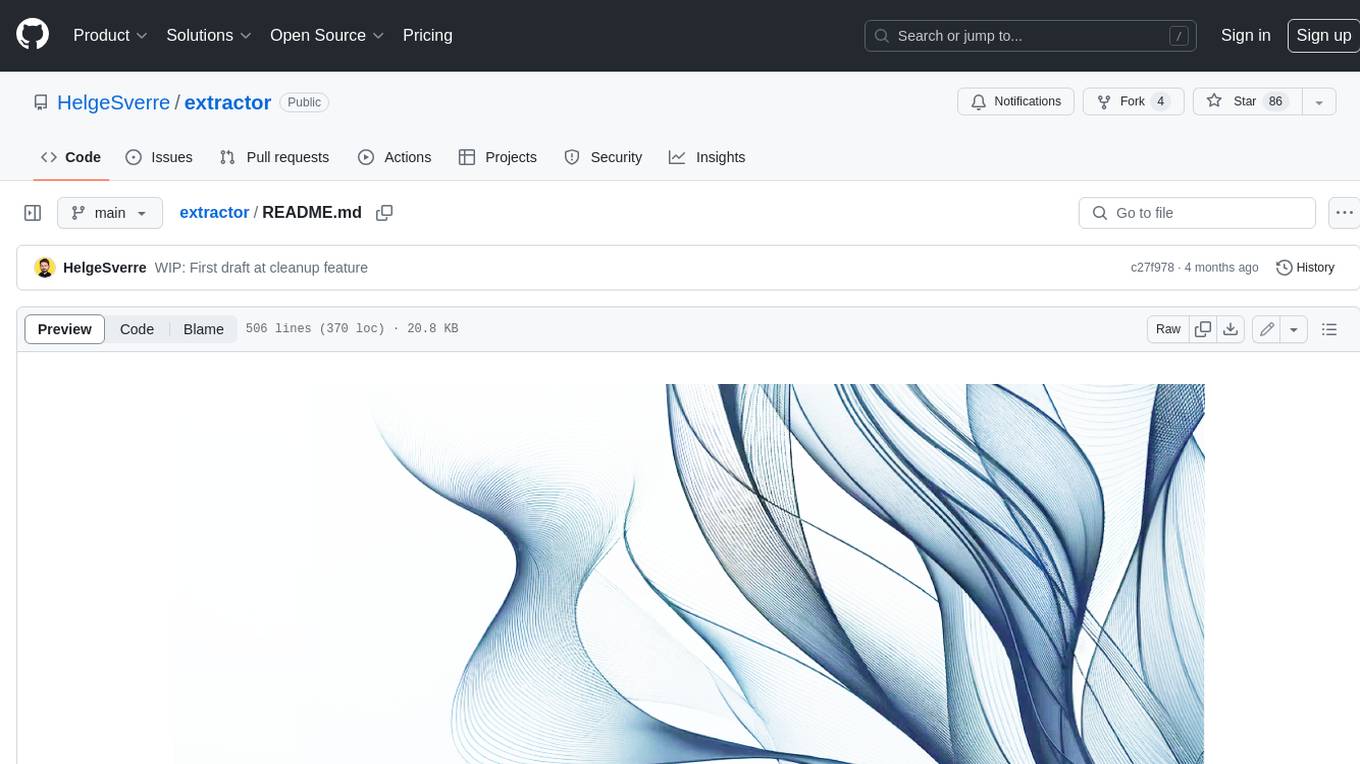
extractor
Extractor is an AI-powered data extraction library for Laravel that leverages OpenAI's capabilities to effortlessly extract structured data from various sources, including images, PDFs, and emails. It features a convenient wrapper around OpenAI Chat and Completion endpoints, supports multiple input formats, includes a flexible Field Extractor for arbitrary data extraction, and integrates with Textract for OCR functionality. Extractor utilizes JSON Mode from the latest GPT-3.5 and GPT-4 models, providing accurate and efficient data extraction.
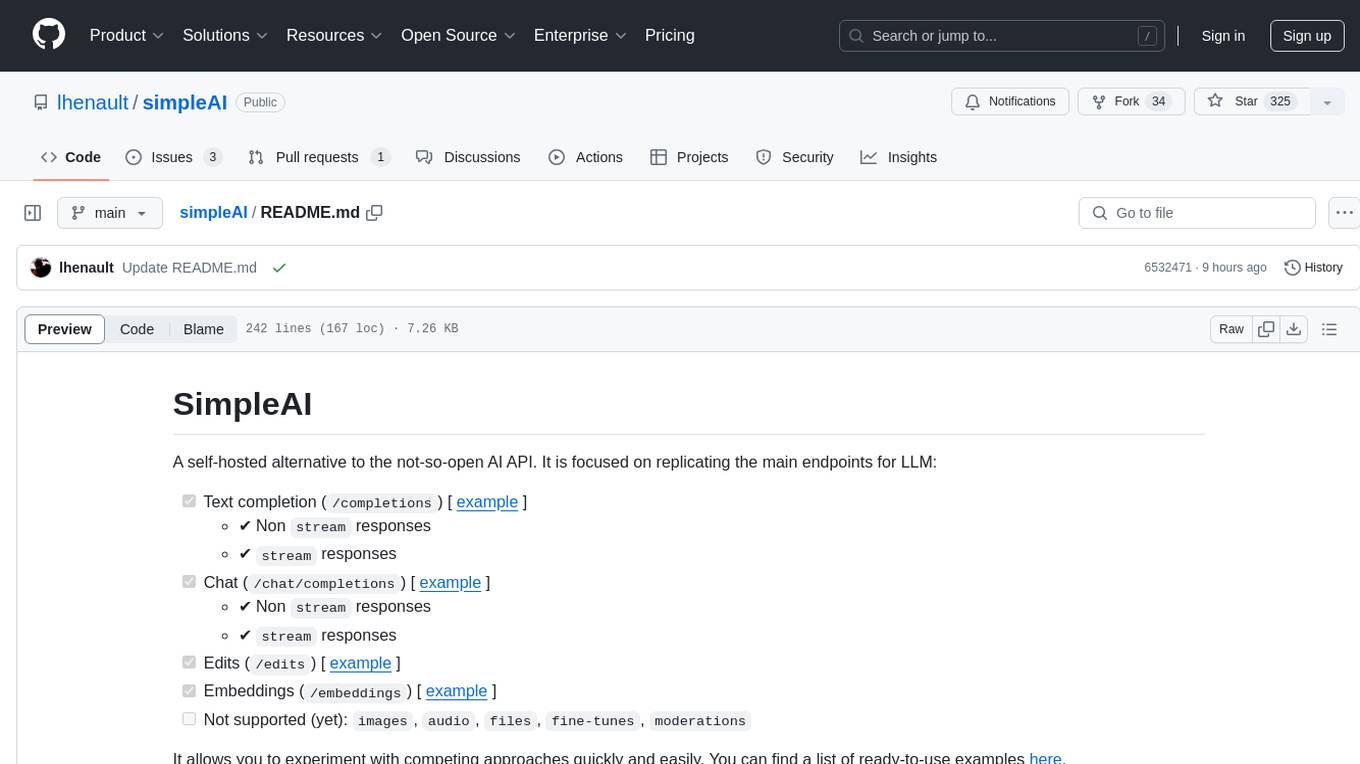
simpleAI
SimpleAI is a self-hosted alternative to the not-so-open AI API, focused on replicating main endpoints for LLM such as text completion, chat, edits, and embeddings. It allows quick experimentation with different models, creating benchmarks, and handling specific use cases without relying on external services. Users can integrate and declare models through gRPC, query endpoints using Swagger UI or API, and resolve common issues like CORS with FastAPI middleware. The project is open for contributions and welcomes PRs, issues, documentation, and more.
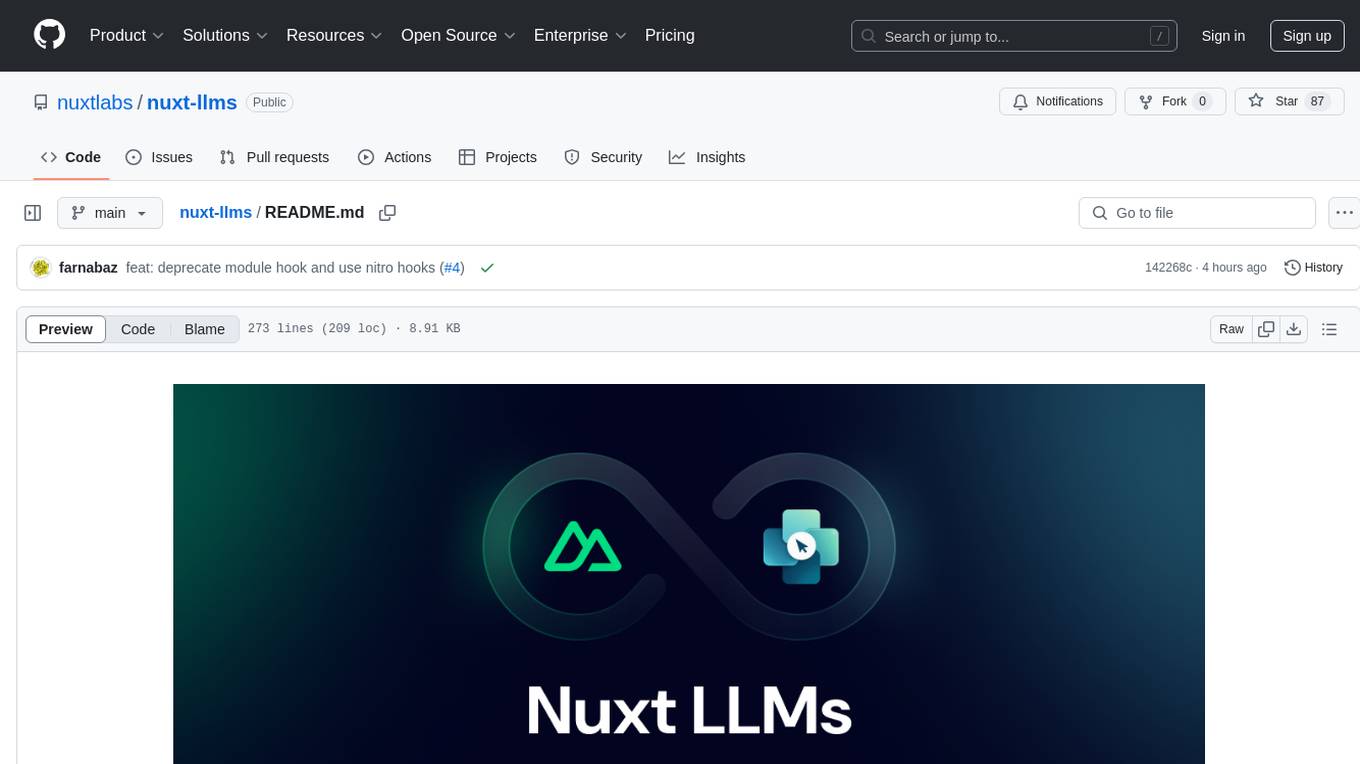
nuxt-llms
Nuxt LLMs automatically generates llms.txt markdown documentation for Nuxt applications. It provides runtime hooks to collect data from various sources and generate structured documentation. The tool allows customization of sections directly from nuxt.config.ts and integrates with Nuxt modules via the runtime hooks system. It generates two documentation formats: llms.txt for concise structured documentation and llms_full.txt for detailed documentation. Users can extend documentation using hooks to add sections, links, and metadata. The tool is suitable for developers looking to automate documentation generation for their Nuxt applications.

instructor
Instructor is a popular Python library for managing structured outputs from large language models (LLMs). It offers a user-friendly API for validation, retries, and streaming responses. With support for various LLM providers and multiple languages, Instructor simplifies working with LLM outputs. The library includes features like response models, retry management, validation, streaming support, and flexible backends. It also provides hooks for logging and monitoring LLM interactions, and supports integration with Anthropic, Cohere, Gemini, Litellm, and Google AI models. Instructor facilitates tasks such as extracting user data from natural language, creating fine-tuned models, managing uploaded files, and monitoring usage of OpenAI models.
For similar tasks

laravel-crod
Laravel Crod is a package designed to facilitate the implementation of CRUD operations in Laravel projects. It allows users to quickly generate controllers, models, migrations, services, repositories, views, and requests with various customization options. The package simplifies tasks such as creating resource controllers, making models fillable, querying repositories and services, and generating additional files like seeders and factories. Laravel Crod aims to streamline the process of building CRUD functionalities in Laravel applications by providing a set of commands and tools for developers.

openai-kotlin
OpenAI Kotlin API client is a Kotlin client for OpenAI's API with multiplatform and coroutines capabilities. It allows users to interact with OpenAI's API using Kotlin programming language. The client supports various features such as models, chat, images, embeddings, files, fine-tuning, moderations, audio, assistants, threads, messages, and runs. It also provides guides on getting started, chat & function call, file source guide, and assistants. Sample apps are available for reference, and troubleshooting guides are provided for common issues. The project is open-source and licensed under the MIT license, allowing contributions from the community.
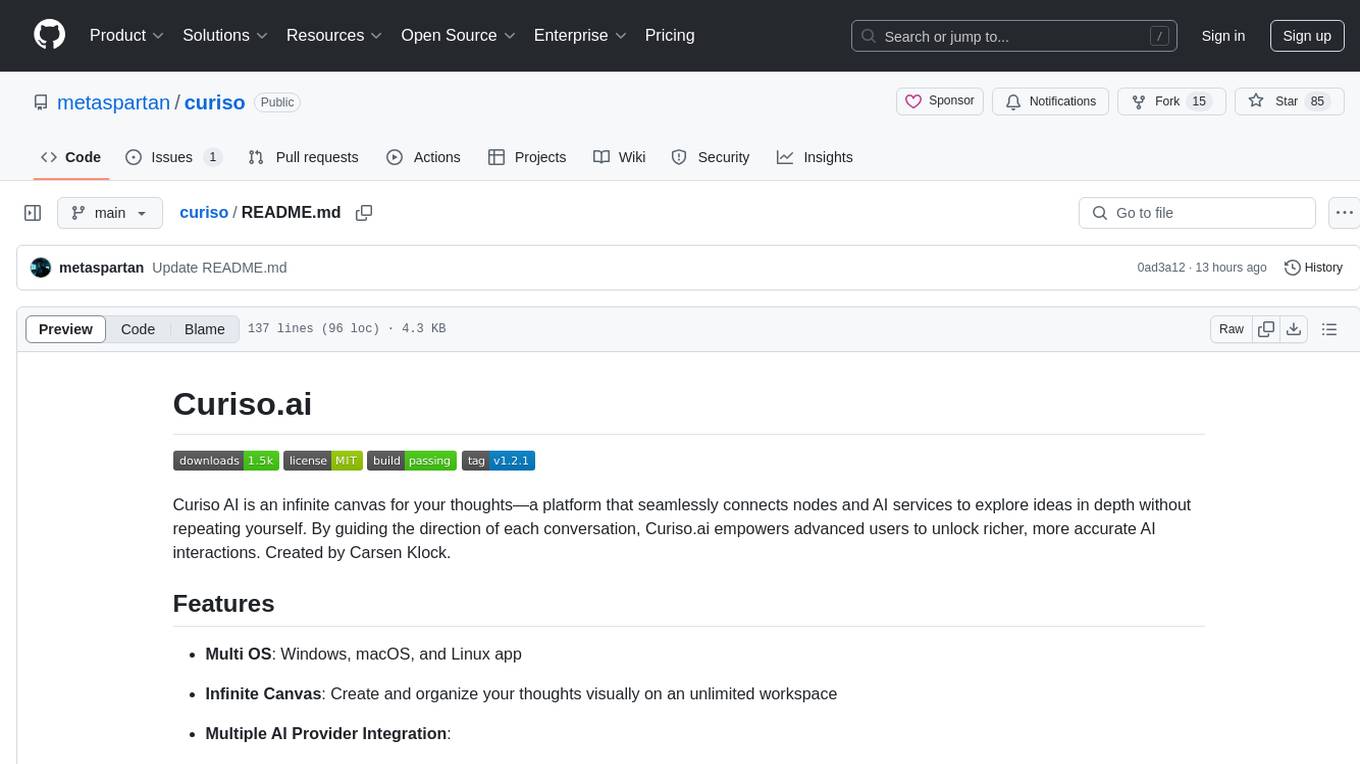
curiso
Curiso AI is an infinite canvas platform that connects nodes and AI services to explore ideas without repetition. It empowers advanced users to unlock richer AI interactions. Features include multi OS support, infinite canvas, multiple AI provider integration, local AI inference provider integration, custom model support, model metrics, RAG support, local Transformers.js embedding models, inference parameters customization, multiple boards, vision model support, customizable interface, node-based conversations, and secure local encrypted storage. Curiso also offers a Solana token for exclusive access to premium features and enhanced AI capabilities.
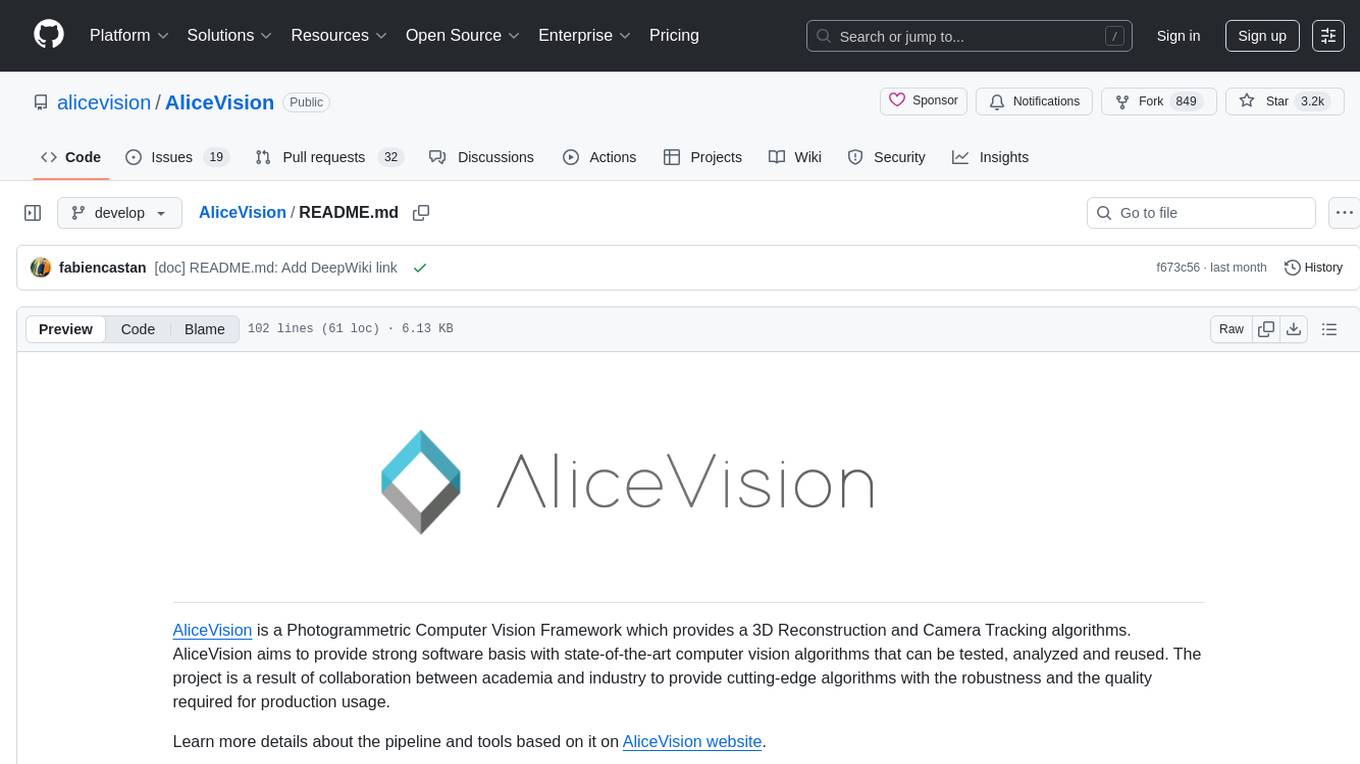
AliceVision
AliceVision is a photogrammetric computer vision framework which provides a 3D reconstruction pipeline. It is designed to process images from different viewpoints and create detailed 3D models of objects or scenes. The framework includes various algorithms for feature detection, matching, and structure from motion. AliceVision is suitable for researchers, developers, and enthusiasts interested in computer vision, photogrammetry, and 3D modeling. It can be used for applications such as creating 3D models of buildings, archaeological sites, or objects for virtual reality and augmented reality experiences.
For similar jobs

resonance
Resonance is a framework designed to facilitate interoperability and messaging between services in your infrastructure and beyond. It provides AI capabilities and takes full advantage of asynchronous PHP, built on top of Swoole. With Resonance, you can: * Chat with Open-Source LLMs: Create prompt controllers to directly answer user's prompts. LLM takes care of determining user's intention, so you can focus on taking appropriate action. * Asynchronous Where it Matters: Respond asynchronously to incoming RPC or WebSocket messages (or both combined) with little overhead. You can set up all the asynchronous features using attributes. No elaborate configuration is needed. * Simple Things Remain Simple: Writing HTTP controllers is similar to how it's done in the synchronous code. Controllers have new exciting features that take advantage of the asynchronous environment. * Consistency is Key: You can keep the same approach to writing software no matter the size of your project. There are no growing central configuration files or service dependencies registries. Every relation between code modules is local to those modules. * Promises in PHP: Resonance provides a partial implementation of Promise/A+ spec to handle various asynchronous tasks. * GraphQL Out of the Box: You can build elaborate GraphQL schemas by using just the PHP attributes. Resonance takes care of reusing SQL queries and optimizing the resources' usage. All fields can be resolved asynchronously.

aiogram_bot_template
Aiogram bot template is a boilerplate for creating Telegram bots using Aiogram framework. It provides a solid foundation for building robust and scalable bots with a focus on code organization, database integration, and localization.

pluto
Pluto is a development tool dedicated to helping developers **build cloud and AI applications more conveniently** , resolving issues such as the challenging deployment of AI applications and open-source models. Developers are able to write applications in familiar programming languages like **Python and TypeScript** , **directly defining and utilizing the cloud resources necessary for the application within their code base** , such as AWS SageMaker, DynamoDB, and more. Pluto automatically deduces the infrastructure resource needs of the app through **static program analysis** and proceeds to create these resources on the specified cloud platform, **simplifying the resources creation and application deployment process**.

pinecone-ts-client
The official Node.js client for Pinecone, written in TypeScript. This client library provides a high-level interface for interacting with the Pinecone vector database service. With this client, you can create and manage indexes, upsert and query vector data, and perform other operations related to vector search and retrieval. The client is designed to be easy to use and provides a consistent and idiomatic experience for Node.js developers. It supports all the features and functionality of the Pinecone API, making it a comprehensive solution for building vector-powered applications in Node.js.

aiohttp-pydantic
Aiohttp pydantic is an aiohttp view to easily parse and validate requests. You define using function annotations what your methods for handling HTTP verbs expect, and Aiohttp pydantic parses the HTTP request for you, validates the data, and injects the parameters you want. It provides features like query string, request body, URL path, and HTTP headers validation, as well as Open API Specification generation.

gcloud-aio
This repository contains shared codebase for two projects: gcloud-aio and gcloud-rest. gcloud-aio is built for Python 3's asyncio, while gcloud-rest is a threadsafe requests-based implementation. It provides clients for Google Cloud services like Auth, BigQuery, Datastore, KMS, PubSub, Storage, and Task Queue. Users can install the library using pip and refer to the documentation for usage details. Developers can contribute to the project by following the contribution guide.

aioconsole
aioconsole is a Python package that provides asynchronous console and interfaces for asyncio. It offers asynchronous equivalents to input, print, exec, and code.interact, an interactive loop running the asynchronous Python console, customization and running of command line interfaces using argparse, stream support to serve interfaces instead of using standard streams, and the apython script to access asyncio code at runtime without modifying the sources. The package requires Python version 3.8 or higher and can be installed from PyPI or GitHub. It allows users to run Python files or modules with a modified asyncio policy, replacing the default event loop with an interactive loop. aioconsole is useful for scenarios where users need to interact with asyncio code in a console environment.

aiosqlite
aiosqlite is a Python library that provides a friendly, async interface to SQLite databases. It replicates the standard sqlite3 module but with async versions of all the standard connection and cursor methods, along with context managers for automatically closing connections and cursors. It allows interaction with SQLite databases on the main AsyncIO event loop without blocking execution of other coroutines while waiting for queries or data fetches. The library also replicates most of the advanced features of sqlite3, such as row factories and total changes tracking.
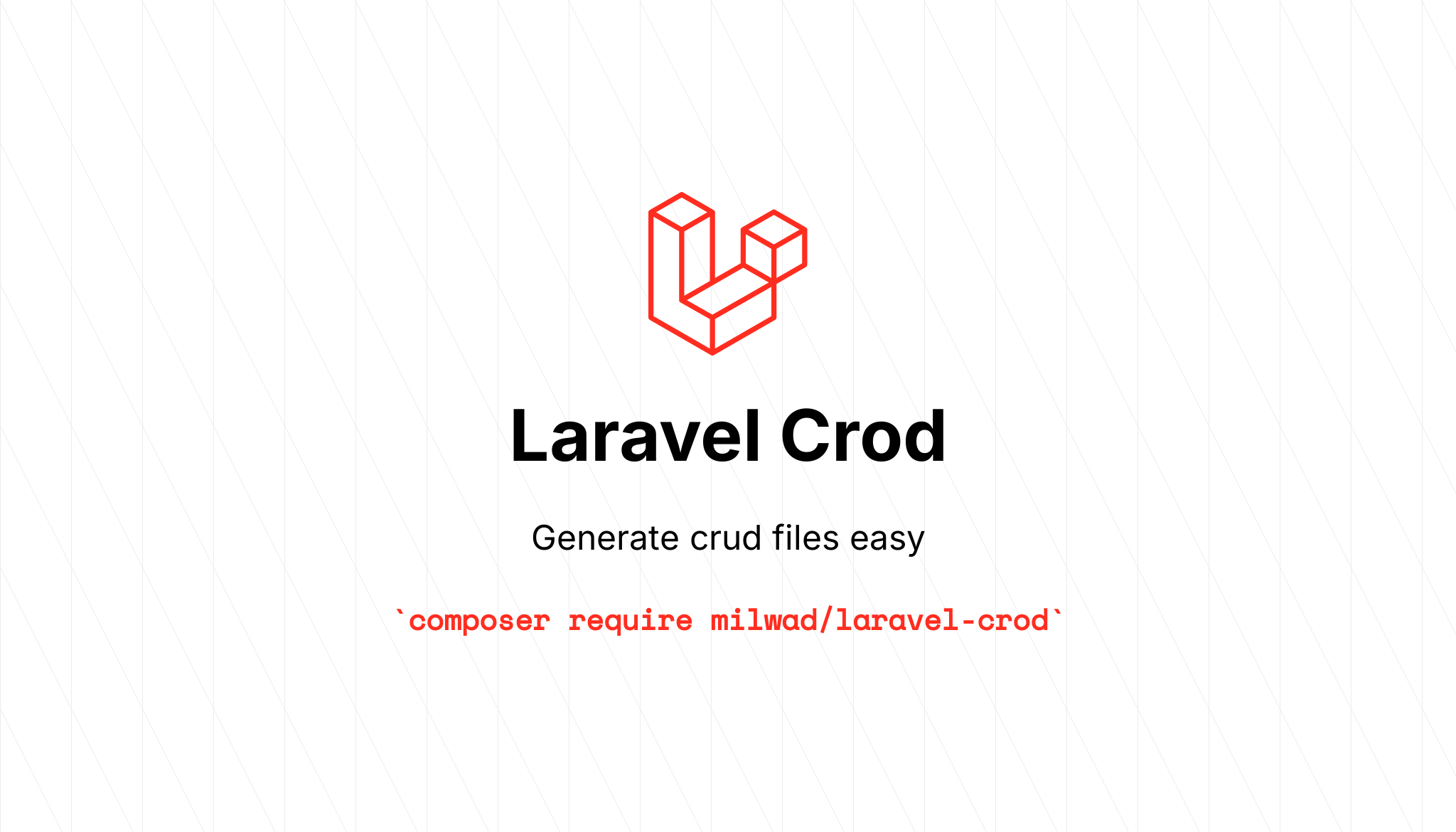




_tqmq.png)
